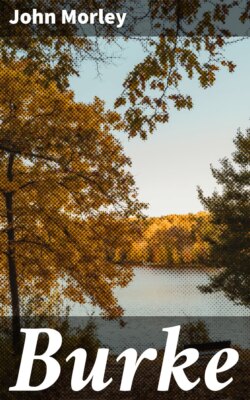Burke

Реклама. ООО «ЛитРес», ИНН: 7719571260.
Оглавление
John Morley. Burke
Burke
Table of Contents
CHAPTER I. EARLY LIFE AND FIRST WRITINGS. CHAPTER II. IN IRELAND—PARLIAMENT—BEACONSFIELD. CHAPTER III. THE CONSTITUTIONAL STRUGGLE. CHAPTER IV. THE ROCKINGHAM PARTY—PARIS—ELECTION AT BRISTOL—THE AMERICAN WAR. CHAPTER V. ECONOMICAL REFORM—BURKE IN OFFICE—FALL OF HIS PARTY. CHAPTER VI. BURKE AND HIS FRIENDS. CHAPTER VII. THE NEW MINISTRY—WARREN HASTINGS—BURKE'S PUBLIC POSITION. CHAPTER VIII. THE FRENCH REVOLUTION. CHAPTER IX. BURKE AND HIS PARTY—PROGRESS OF THE REVOLUTION—IRELAND—LAST YEARS. CHAPTER X. BURKE'S LITERARY CHARACTER. BURKE
CHAPTER I
EARLY LIFE, AND FIRST WRITINGS
CHAPTER II
IN IRELAND—PARLIAMENT—BEACONSFIELD
CHAPTER III
THE CONSTITUTIONAL STRUGGLE
CHAPTER IV
THE ROCKINGHAM PARTY—PARIS—ELECTION AT BRISTOL—THE AMERICAN WAR
CHAPTER V
ECONOMICAL REFORM—BURKE IN OFFICE—FALL OF HIS PARTY
CHAPTER VI
BURKE AND HIS FRIENDS
CHAPTER VII
THE NEW MINISTRY—WARREN HASTINGS—BURKE'S PUBLIC POSITION
CHAPTER VIII
THE FRENCH REVOLUTION
CHAPTER IX
BURKE AND HIS PARTY—PROGRESS OF THE REVOLUTION—IRELAND—LAST YEARS
CHAPTER X
BURKE'S LITERARY CHARACTER
THE END
Отрывок из книги
John Morley
Published by Good Press, 2019
.....
From the very beginning, therefore, Burke was drawn to the deepest of all the currents in the thought of the eighteenth century. Johnson and Goldsmith continued the traditions of social and polite literature which had been established by the Queen Anne men. Warburton and a whole host of apologists carried on the battle against deism and infidelity. Hume, after furnishing the arsenal of scepticism with a new array of deadlier engines and more abundant ammunition, had betaken himself placidly to the composition of history. What is remarkable in Burke's first performance is his discernment of the important fact, that behind the intellectual disturbances in the sphere of philosophy, and the noisier agitations in the sphere of theology, there silently stalked a force that might shake the whole fabric of civil society itself. In France, as all students of its speculative history are agreed, there came a time in the eighteenth century when theological controversy was turned into political controversy. Innovators left the question about the truth of Christianity, and busied themselves with questions about the ends and means of governments. The appearance of Burke's Vindication of Natural Society coincides in time with the beginning of this important transformation. Burke foresaw from the first what, if rationalism were allowed to run an unimpeded course, would be the really great business of the second halt of his century.
If in his first book Burke showed how alive he was to the profound movement of the time, in the second he dealt with one of the most serious of its more superficial interests. The essay on the Sublime and Beautiful fell in with a set of topics on which the curiosity of the better minds of the age, alike in France, England, and Germany, was fully stirred. In England the essay has been ordinarily slighted; it has perhaps been overshadowed by its author's fame in weightier matters. The nearest approach to a full and serious treatment of its main positions is to be found in Dugald Stewart's lectures. The great rhetorical art-critic of our own day refers to it in words of disparagement, and in truth it has none of the flummery of modern criticism. It is a piece of hard thinking, and it has the distinction of having interested and stimulated Lessing, the author of Laoköon (1766), by far the most definitely valuable of all the contributions to aesthetic thought in an age which was not poor in them. Lessing was so struck with the Inquiry that he set about a translation of it, and the correspondence between him and Moses Mendelssohn on the questions which Burke had raised contains the germs of the doctrine as to poetry and painting which Laoköon afterwards made so famous. Its influence on Lessing and on Kant was such as to justify the German historian of the literature of the century in bestowing on it the coveted epithet of epoch-making.
.....